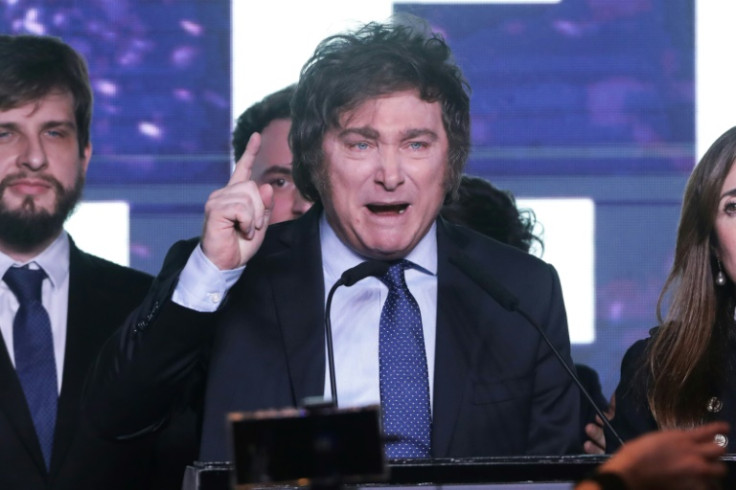What To Know About Argentina's Shock Presidential Frontrunner

Argentina has been left reeling by the surprise surge of political outsider Javier Milei to the front of the race ahead of October presidential elections.
Here are some key things to know about the brash Buenos Aires lawmaker and what his rise means for the beleaguered South American nation.
The presidential elections are still two months away, but an unusual nationwide system of party primaries held on Sunday handed Milei the most votes -- a key indicator of what is to come.
In the run-up to Sunday's vote, opinion polls and political analysts did not expect a real challenge to traditional parties from the anti-establishment outsider, who scored just over 30 percent of the votes, slightly more than his two main rivals.
"No one imagined such an outcome for Milei. He came first in areas where he has no structure or support," said political scientist Juan Negri, of the Torcuato di Tella University.
"An elephant walked past us, and we did not see it," wrote the Clarin daily.
Elected to parliament in 2021, the 52-year-old economist with disheveled hair has grabbed public attention with his radical ideas, regularly appearing on televised panels and with a strong presence on social media.
Political analyst Gabriel Puricelli said Milei had managed to grab hold of a growing discontent in the country and "build an electorate" out of nothing.
Asked why they support Milei, his backers, young and old, invariably express the desire for something new in a country dogged by economic malaise.
"Ten years of stagnation and five of high inflation fed into the skepticism of a large part of the population," toward the status quo, said Puricelli.
Argentina's political scene has for decades been dominated by Peronism -- heavy on state intervention, subsidies, and welfare programs -- with brief periods of governance by the center-right.
The country is facing annual inflation of 115 percent, and poverty levels are at 40 percent.
With the peso constantly under threat, Argentines' only hope of saving for the future is immediately buying dollars -- on the informal market due to strict currency controls.
"Our parents, our grandparents, voted for Peronism 20 years ago, 30 years ago, but the country has stayed the same," said 20-year-old student Carolina Carabajal.
Political analyst Carlos Fara said there was a sense of having "nothing to lose, let's try something new because the others have failed."
While described alternately as libertarian, far-right, or anti-establishment, Milei's political views are hard to pin down.
He is ultraliberal on the economy, against the minimum wage, and wants austerity "harsher than that requested" by the International Monetary Fund, to whom Argentina owes $44 billion.
He describes himself as an "anarcho-capitalist" and says he is "above all for freedom."
He has proposed dollarizing the economy, "dynamiting the central bank," and doing away with the ministries of education, health and public works, which he wants to replace with private investment.
On some social issues he is conservative, wanting to ban abortion and get rid of sexual education in schools.
"A man with dozens of faces," wrote journalist Juan Gonzalez in an unauthorized biography of Milei.
Unmarried and childless, he lives alone with four mastiffs named after liberal economists. His sister, Karina, is his right-hand woman.
With Milei now in the mix as a serious challenger, the October 22 presidential election has been thrown wide open with three main candidates.
He is running against former security minister Patricia Bullrich on the right, and Economy Minister Sergio Massa from the ruling center-left coalition -- who came second and third respectively in the primary election by only a narrow margin.
None of them are facing an easy ride.
Milei and Bullrich will jockey for similar voters on the right, while Massa will try to retain moderate voters while battling bad economic news in the run-up to the vote.
sa-pbl/fb/tjj
© Copyright AFP 2024. All rights reserved.







